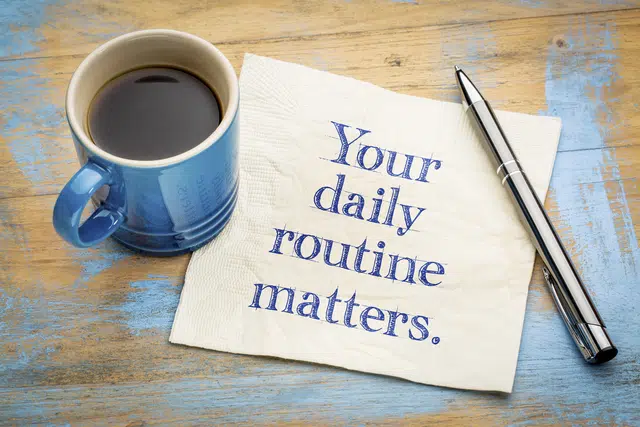It’s no surprise that the routine you likely once had no longer exists. While it might be tempting to go with the flow and see how the day goes, the opposite is true. Changes in routine is stressful for adults and kids, so it’s important especially during this time of social distancing, when everyone’s routines have been thrown off, to create a new routine for you and and your family.
Many people are tasked with a new reality of working and teaching from home. Many others have been laid off and are adjusting to being at home, helping their kids with online tasks and finding work or other financial relief at the same time.
Filling the roles of work, home and school can be a perfect storm for creating chaos in your home. Social media posts filled with beautiful color-coded schedules for the kids may seem overwhelming and defeating.
Here are some things to consider to provide structure and meaning to your day while being stuck at home and adjusting to a new way of life.
ROUTINE
Structure provides a sense of security – it lets us know what to expect next, which is especially important during the COVID-19 pandemic when everything seems so uncertain. Kids and adults both can thrive from creating a new routine.
The idea is to make a routine and keep it fluid. Changes will need to be made along the way. You will find some things work and some don’t. Give yourself and your family the freedom to adjust to what works best for everyone.
Work together with your kids to find a routine that works for everyone. Here are a few suggestions:
- Create a list of what tasks need to be done each day, fit them into a daily schedule and add in breaks, lunch, time outside.
- For kids – Create a rough outline of what their e-learning expectations and requirements are. Example: Math, Reading, Science, Reading, Instrument practice, Exercise and/or Outside time.
CHOICE
Encourage kids to take ownership of their day. Create a list of tasks that need to be completed each day and have your child create their own schedule. Giving kids control of their day gives them the meaning and structure they need in their day, without feeling overwhelmed or like everyone is telling them what to do.
Let go of the things that are not detrimental to productivity and learning. Do your teenagers want to sleep until 10am and start academic work after lunch? Pick your battles. It’s impossible to recreate the school environment at home, so don’t try. There’s no need.
LET GO
Release the things you can not control. “Normal” today is not what it was a few months ago. Each day, ask yourself: what expectations of “normal” can I let go of today?
CONNECTION
Who are you checking on or connecting with every day? Even though you are restricted to your home except for non-essential activities, find creative ways to connect with others.
Schedule a virtual happy hour with your friends through Zoom or Skype.
Have a Netflix Party with a new feature that allows you to have long-distance movie nights. This feature is an extension on the Google Chrome browser and lets you sync movie playback so you’re watching it together and adds a group chat.
Get creative!
OUTSIDE
Going outside has many physical and mental health benefits from improved mood to reducing feelings of anxiety and stress. Fresh air and sunshine naturally boost serotonin levels – the chemical in your brain that makes you feel happy.
So, make a commitment to get outside every day if you can. Take a walk. Play. Sit outside.
MOVE
Move your body every day. Combine this with your outside time for boosted benefits. Exercise calms anxiety, improves focus and mood, and boosts creativity. Not having time to exercise may not be a barrier anymore, and many fitness programs are offering free online fitness classes. Try something new and have fun!
SELF CARE
Be sure to spend time each day taking care of yourself. Avoid stress eating or drinking too much alcohol due to stress or boredom. These unhealthy habits will only make stress and overwhelm worse in the long run.
- Eat healthy food
- Give yourself permission to get it wrong sometimes
- Try again the next day
- Be flexible – these days with news and regulations changing nearly every day it’s important to bend and not hold yourself to rigid and unrealistic expectations
- Take breaks when you need to
- Connect with others and ask for help if you need it!
In recent months, taking care of your mental health is more important than ever. Do your best to focus on your family’s need for safety and structure, and make connection with loved ones a priority.
If you or someone you know is struggling to adjust to life during the COVID-19 pandemic, reach out to a therapist who can help you. Most mental health professionals can provide services virtually through teletherapy.
Are you ready to reach out for support? Let’s connect! Call us or email to connect with a licensed therapist who specializes in children and adolescents with anxiety.
940-222-8552 or [email protected]
Teen Social Anxiety

